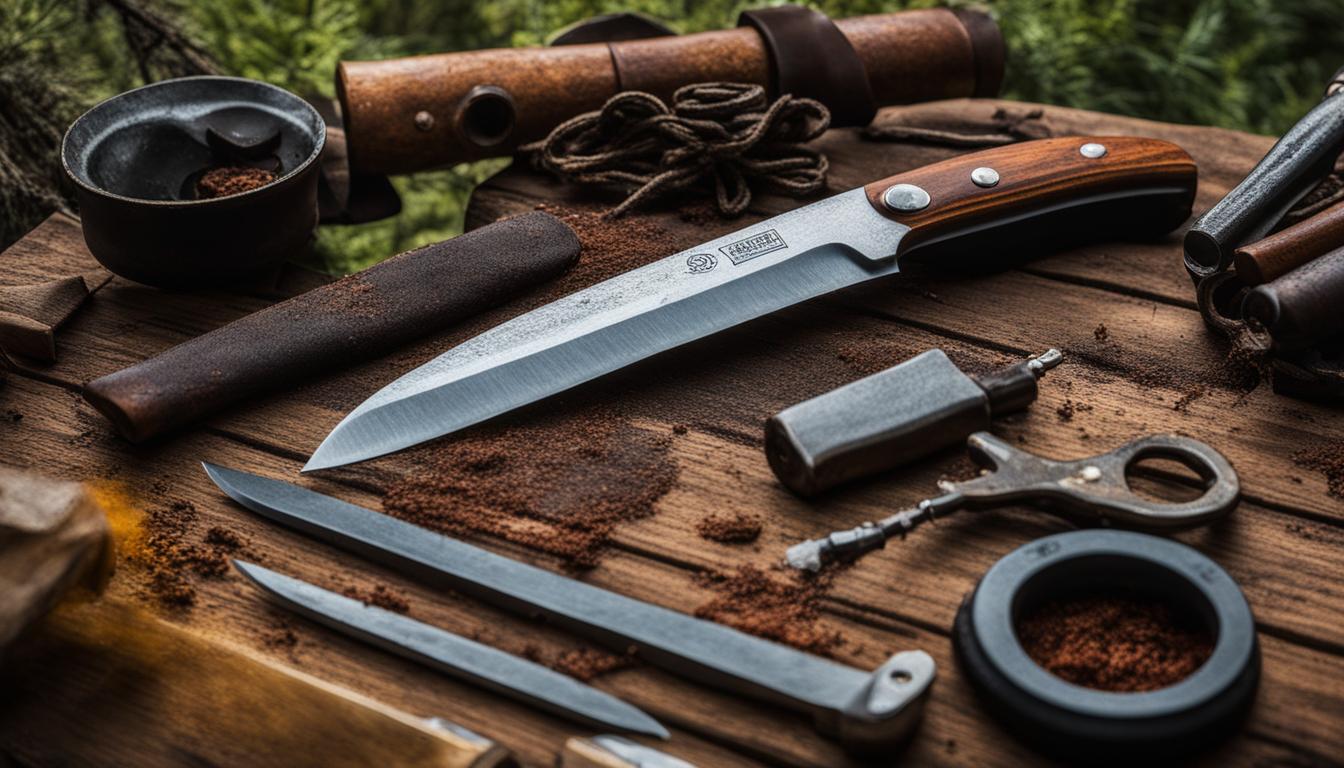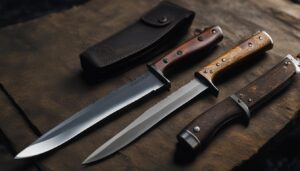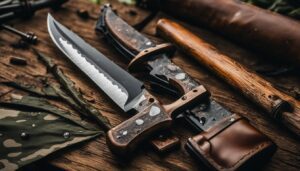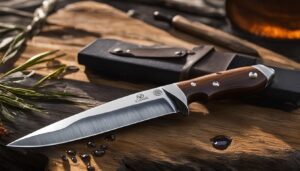Rust is a common issue with hunting knives, but it can be prevented with proper care and maintenance. Stainless steel blades are not immune to rust, so it’s important to take proactive steps to keep your knife rust-free. In this article, I will explore effective methods to prevent rust on your hunting knife, including household remedies, commercial rust removers, and routine maintenance tips. With these tips, you can ensure that your hunting knife stays in pristine condition and ready for use.
Key Takeaways:
- Proper care and maintenance can prevent rust on your hunting knife.
- Stainless steel blades are not immune to rust.
- Household remedies like white vinegar and baking soda can be used to remove rust.
- Commercial rust removers are available for more stubborn rust spots.
- Routine maintenance, including proper storage and regular inspections, is essential for rust prevention.
Understanding Rust and Its Causes
Rust is a common issue that can affect hunting knives, even those made with stainless steel blades. To effectively prevent rust on your hunting knife, it is important to understand the causes behind its formation. Rust occurs when metal reacts with oxygen, air, water, and moisture in the environment. While stainless steel is more resistant to rust than other metals, it can still develop rust spots if not properly cared for.
Exposure to moisture, high humidity, and improper storage are key factors that contribute to the formation of rust on hunting knives. Moisture, in any form, can accelerate the rusting process. If your hunting knife comes into contact with water, it is important to dry it thoroughly to prevent the moisture from causing rust. Proper storage in a low humidity environment is also crucial to protect your knife from unnecessary moisture exposure.
In order to effectively prevent rust, it is important to address these underlying causes. By understanding the factors that contribute to rust formation, you can take proactive steps to ensure the longevity and performance of your hunting knife.
The Impact of Rust on Hunting Knives
“Rust not only affects the appearance of your hunting knife, but it can also compromise its functionality and performance. Rust can cause the blade to become dull or even weaken it, making it less effective when cutting or skinning. Additionally, if rust is left untreated, it can continue to spread and corrode the metal, further damaging your knife.”
Addressing rust promptly is key to preventing further damage to your hunting knife. By taking the necessary preventive measures and understanding the causes of rust, you can ensure that your knife remains in optimal condition for your hunting adventures.
| Cause | Effect |
|---|---|
| Exposure to moisture | Accelerates rust formation on the blade |
| High humidity | Creates a conducive environment for rust to develop |
| Improper storage | Increases the risk of moisture exposure and rust formation |
Household Remedies for Rust Prevention
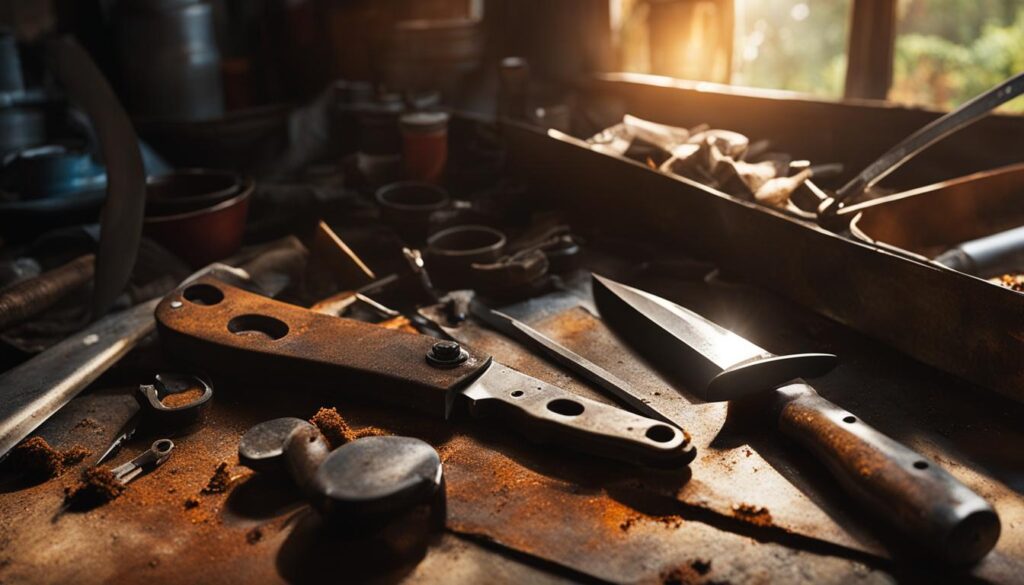
When it comes to preventing rust on your hunting knife, you don’t have to look further than your own home. There are several household items that can effectively remove rust and keep your knife in top condition. These cost-effective remedies are easily accessible and can be used as part of your routine maintenance.
Vinegar
White vinegar, with its acetic acid content, is a powerful rust remover. Simply pour some vinegar onto a cloth or sponge and apply it to the rusted areas of your knife. Allow it to sit for a few minutes to dissolve the rust, then scrub away the residue with a brush or steel wool. Rinse the blade thoroughly, dry it completely, and apply a light coat of oil to protect it from future oxidation.
Baking Soda
Baking soda is another effective household remedy for rust prevention. Mix baking soda with water to create a thick paste, and apply it to the rusted areas of your knife. Use a brush or sponge to scrub the paste into the rust spots, then rinse the blade clean and dry it thoroughly. The alkaline nature of baking soda helps neutralize the acidic rust and prevents further corrosion.
Steel Wool and Raw Potato
For stubborn rust spots, steel wool can come to the rescue. Gently scrub the rusted areas with the steel wool, applying light pressure until the rust is completely removed. Make sure to rinse the blade thoroughly and dry it completely to prevent any moisture buildup.
Alternatively, you can also use a raw potato to remove rust from your hunting knife. Cut the potato in half and dip it in dish soap or baking soda. Rub the cut side of the potato over the rusted areas, applying gentle pressure. Rinse the blade, dry it thoroughly, and apply a protective coating of oil.
By utilizing these common household remedies, you can effectively prevent and remove rust from your hunting knife. Incorporating these methods into your routine maintenance will help keep your knife in pristine condition, ensuring it remains rust-free and ready for your next hunting adventure.
Commercial Rust Removers
While household remedies can be effective in removing rust from hunting knives, there are also commercial rust removers available on the market that are specifically designed for this purpose. These rust removers are formulated to be safe for the blades and can provide a convenient option when dealing with more stubborn rust.
Commercial rust removers come in various forms, such as sprays, soaking solutions, or wipes. They are designed to effectively dissolve rust and restore the knife to its original condition. The instructions for use may vary depending on the product, so it is important to read and follow them carefully for the best results.
When choosing a commercial rust remover, consider factors such as the severity of the rust, the type of metal your knife is made of, and any specific instructions or precautions provided by the manufacturer. It is recommended to test the rust remover on a small, inconspicuous area of the knife first to ensure compatibility and avoid any potential damage.
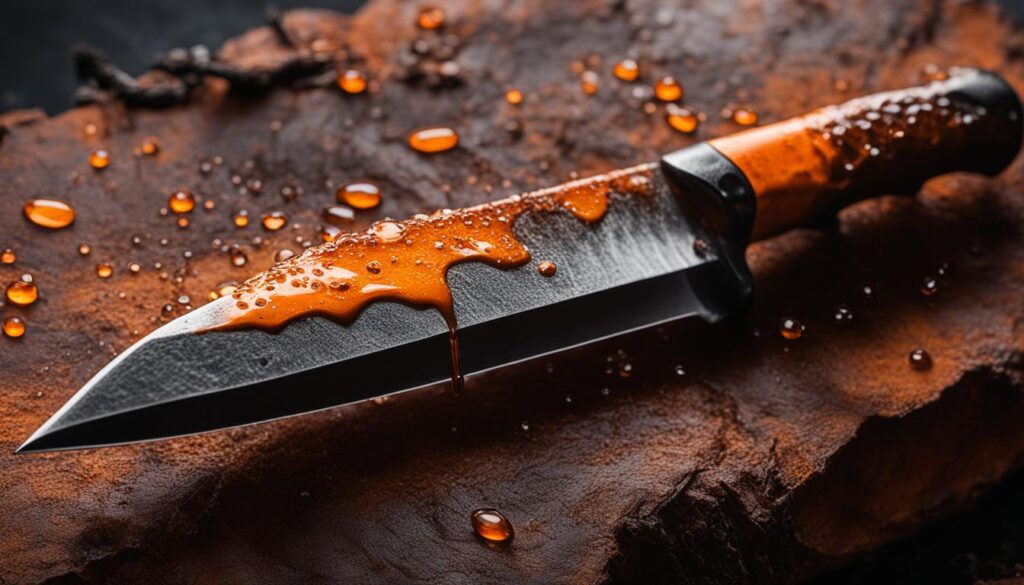

Comparison of Commercial Rust Removers
| Product | Description | Application | Effectiveness |
|---|---|---|---|
| Rust-B-Gone | A powerful rust remover with fast-acting formula | Apply directly to the rusted areas, let it sit for a few minutes, then scrub with a brush | Highly effective in removing even the toughest rust |
| Rust Away | Gentle yet effective rust remover suitable for delicate blades | Soak the knife in Rust Away solution for a recommended duration, then wipe off the rust | Effectively removes rust without damaging the knife’s surface |
| Rust Shield | A rust prevention spray that also removes light rust | Spray directly onto the rusted areas, let it penetrate, then wipe off with a cloth | Works well for light rust and provides long-lasting protection against future rust |
“Using a commercial rust remover can save time and effort when dealing with stubborn rust on your hunting knife. Just make sure to choose a product that is suitable for your knife’s material and follow the instructions carefully.”
Routine Maintenance for Rust Prevention
Proper care and routine maintenance are essential for preventing rust on your hunting knife. By following a few simple steps, you can ensure that your knife stays in optimal condition and protected from rust.
Regular Cleaning
After each use, it’s important to clean your hunting knife thoroughly. Use a mild soap and warm water to gently wash the blade, making sure to remove any dirt, debris, or moisture. Dry the knife completely with a soft cloth to prevent any residual moisture from causing rust.
Applying a Protective Barrier
Once the knife is clean and dry, it’s a good idea to apply a thin layer of oil to the blade. This helps create a protective barrier that prevents moisture from coming into contact with the metal. Mineral oil or vegetable oil can be used for this purpose.
Ensure that the entire blade is coated with the oil and then wipe off any excess. Be sure to store the knife in a dry location to further protect it from moisture.
Regular Inspection
To catch any rust or damage early on, it’s important to regularly inspect your hunting knife. Pay close attention to the blade, handle, and any moving parts. If you notice any signs of rust, take immediate action to clean and remove it.
In addition to rust, also check for any loose or damaged components that could affect the knife’s performance. By addressing any issues promptly, you can prevent further damage and extend the lifespan of your hunting knife.
Proper Storage
How you store your hunting knife can also impact its susceptibility to rust. Avoid storing it in damp or humid environments, as moisture can accelerate rust formation. Instead, consider using a display case or a leather sheath to protect the knife from moisture.
It’s important to store the knife in a location with low humidity and good air circulation. This will help prevent the buildup of moisture and reduce the risk of rust formation.
| Summary of Routine Maintenance for Rust Prevention |
|---|
| 1. Clean the knife thoroughly after each use using mild soap and warm water. |
| 2. Dry the knife completely with a soft cloth to remove any moisture. |
| 3. Apply a thin layer of oil to create a protective barrier against moisture. |
| 4. Regularly inspect the knife for any signs of rust or damage. |
| 5. Store the knife in a dry location with low humidity and good air circulation. |
How Much Rust Is Too Much?
When it comes to rust on your hunting knife, it is important to understand the extent of the damage and when to address it. Light rust spots can often be easily removed using household remedies or commercial rust removers. However, if your knife is heavily rusted or has layers of rust encrusted on it, a more extensive cleaning and restoration process may be needed.
Evaluating the amount of rust on your hunting knife is crucial in determining the necessary action. If the rust is superficial and limited to small areas, a simple cleaning with a household remedy or commercial rust remover may suffice. On the other hand, if the rust has spread across a significant portion of the blade or has caused pitting and corrosion, more intensive restoration methods may be required.
It is always recommended to address rust as soon as possible to prevent further damage to the knife. Ignoring rust can lead to the weakening of the blade, compromising its structural integrity. Regularly inspecting your hunting knife for any signs of rust and promptly addressing them will help prolong its lifespan and ensure optimal performance.
Determining the Severity of Rust Damage
When assessing rust damage on your hunting knife, consider the following factors:
- The size and number of rust spots: Small spots of rust can often be easily treated, while larger or numerous spots may require more extensive cleaning and restoration.
- Depth of rust penetration: If the rust has penetrated deep into the blade, it may weaken the metal and require professional restoration.
- Pitting and corrosion: If the rust has caused pitting or corrosion, the affected areas may need to be smoothed out to restore the blade’s functionality and appearance.
- Affected areas: Assess which parts of the knife are affected by rust. If the blade, handle, or other components show signs of rust, appropriate measures should be taken to prevent further damage.
By carefully evaluating the extent of rust damage on your hunting knife and taking appropriate action, you can ensure its longevity and preserve its performance for years to come.
Protect Your Investment with Rust Prevention Techniques
As a hunting knife owner, I understand the importance of keeping my knife in top condition and free from rust. Rust can compromise the performance and longevity of your knife, so it’s crucial to employ effective rust prevention techniques.
One of the key tips for rust prevention is to regularly inspect and clean your knife. After each use, thoroughly clean the blade with mild soap and warm water, making sure to dry it completely with a soft cloth to remove any moisture. This simple routine maintenance can go a long way in preventing rust formation.
Another rust prevention technique is proper storage. Storing your hunting knife in a low humidity environment, such as a display case or a leather sheath, can protect it from moisture and rust. Additionally, applying a thin layer of oil, such as mineral oil or vegetable oil, to the blade can create a protective barrier against rust.
Lastly, it’s crucial to address any signs of rust promptly. Whether it’s light rust spots or more extensive rust damage, taking immediate action can help prevent further corrosion and preserve the effectiveness of your knife. Use household remedies like white vinegar or baking soda for light rust, or consider commercial rust removers for more stubborn rust.
FAQ
What causes rust on hunting knives?
Rust is formed when metal reacts with oxygen, air, water, and moisture in the environment. Even stainless steel blades can develop rust spots if not properly cared for.
Can household remedies be used to remove rust from hunting knives?
Yes, household items such as white vinegar, baking soda, steel wool, and even a raw potato can be effective in removing rust from hunting knives.
Are there commercial rust removers available for hunting knives?
Yes, there are commercial rust removers specifically designed for hunting knives that can be used for both light rust spots and heavily rusted knives.
How important is routine maintenance for preventing rust?
Routine maintenance, including proper storage, regular cleaning, and the application of a protective oil layer, is crucial for preventing rust on hunting knives.
How do I know when to address rust on my hunting knife?
The extent of rust damage determines the necessary action. Light rust spots can often be removed easily, but heavily rusted knives may require more extensive cleaning and restoration.
How can I protect my hunting knife from rust?
By understanding the causes of rust and employing various preventive measures, such as using household remedies, commercial rust removers, and practicing routine maintenance, you can protect your hunting knife from rust.
